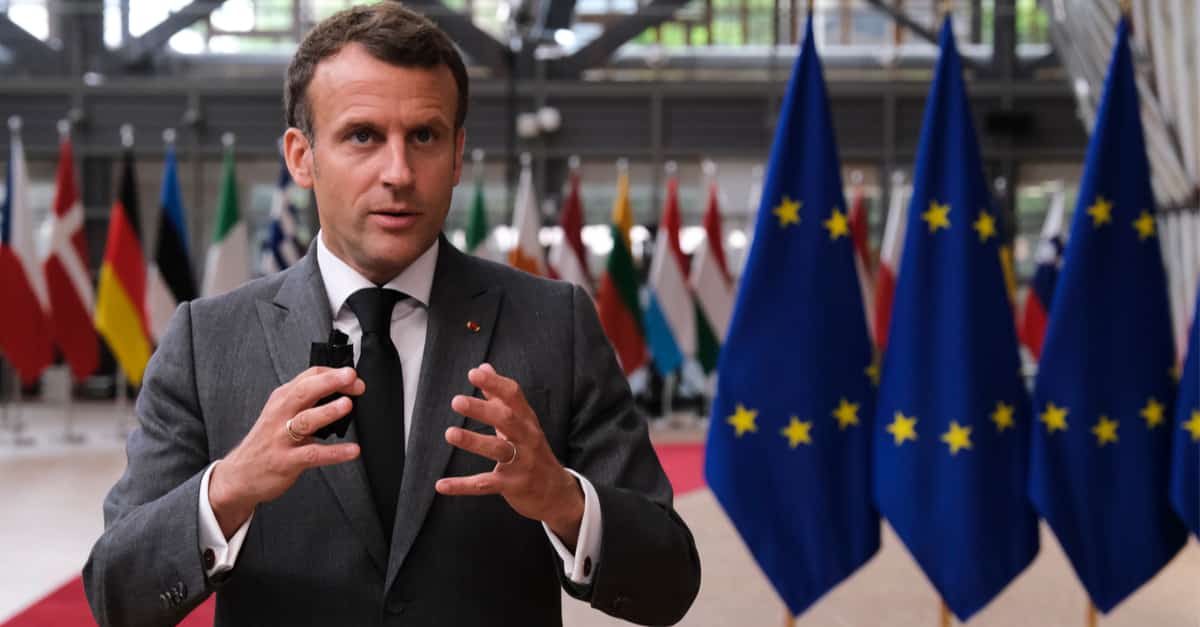The French president has made ‘sovereignty’ a buzzword. Yet corporations seem to enjoy more than citizens.

The French president, Emmanuel Macron, presents the agenda of his government’s presidency of the EU Council to the European Parliament today in a plenary in Strasbourg. One word likely to recur during his speech will be ‘sovereignty’, a buzzword in his recent speeches about Europe. But what does Macron mean by this term, and what implications does it have for EU citizens?
The slogan of the French EU presidency, covering the first half of 2022, is relance, puissance, appartenance (revival, power, belonging). All three terms are variations of the concept of ‘sovereignty’, which goes with the ‘strategic autonomy’ the French government advocates with other players at the EU level.
Indeed, ‘sovereignty’ in various forms—climate sovereignty, digital sovereignty, industrial sovereignty and so on—has become a repetitive theme in everything the French government has to say about Europe. At face value, the emphasis on greater control over global economic forces and competition, and on boosting the resilience and autonomy of the European economy, is laudable.
Corporate capture
Unfortunately, the ‘sovereignty’ pushed by the French government comes at great risk of even deeper corporate capture of EU policy-making, as well as of focusing on technology as the only possible response to environmental and social challenges. In this vision, the ‘sovereignty’ slogan combines a neoliberal element (pro-business, pro-market reforms) and a neoconservative element (globalisation as a competition among great powers represented by their corporations), while seeking to articulate some response to the perceived expectations of European citizens for more ‘protection’ from external forces.
It is therefore no surprise that the emphasis on ‘sovereignty’ has been explicitly endorsed by French big business, including MEDEF (the French lobby group for large corporations and employers) and sectoral trade associations. As we have mapped in detail in our recent report Under the Influence, the vision of ‘sovereignty’ promoted by the French government is based on the assumption—a sort of expanded version of ‘trickle-down’ economics—that what is good for European corporate ‘champions’ will necessarily be good for Europe and its citizens.
In effect, under the pretext of promoting Europe’s autonomy in the face of growing global risks and increasing international competition, France is pushing for ever greater public funding and political support for a handful of large corporations and for ever closer public-private collaboration in specific industrial sectors. These include some of the most toxic or controversial industries: nuclear power, fossil fuels, vehicles, arms and Big Tech.
As just one example, while Macron is keen to be seen as a climate champion, making industry-driven technology the sole possible response to climate change is a political choice. The government has come under fire for building a cynical alliance with Poland and Hungary to push for the inclusion of natural gas (a fossil fuel) and nuclear electricity in the EU ‘green taxonomy’, which will direct financial flows accordingly—and this is reflected in the rules the European Commission has now drafted. Macron recently announced massive investments in French nuclear-energy generation.
The government is also supporting hydrogen production as a new market for nuclear-generated electricity. Hydrogen is often presented by industry and some governments as a ‘green’ and ready-for-use climate solution, although this is very far from the truth, as almost all hydrogen is produced from fossil or nuclear energy. Key corporate beneficiaries in the energy field include the French EDF, TotalEnergies and Engie.
Dictating terms
Against the backdrop of copious lobby meetings and consultations with corporate interests and allies, and a revolving door between the French public and private sectors, corporate sponsorship has been accepted for the EU presidency—despite opposition from thousands of EU citizens. Macron’s increased financial and political support for corporate champions does not however seem to entail any obligations for the beneficiaries.
The French government has, albeit with exceptions, refused to impose any conditions—in terms of climate, jobs or tax justice—on the companies that receive bailout or recovery funds. At EU level it has been accomplice to pharmaceutical companies essentially dictating terms for the supply of vaccines, which has led to a global vaccine apartheid and so a needlessly prolonged pandemic. And on issues facing the French presidency, such as corporate due diligence, the rights of platform workers and business taxation, there is a real risk the Élysée will be susceptible to corporate-lobby demands.
When he became French president in 2017, Macron argued persuasively that ‘we must simply stop building our Europe in isolation from the people’. Yet, far from making the EU more democratic and more responsive to the needs and aspirations of European citizens, his vision of ‘sovereignty’ actually risks exacerbating some of the ills plaguing the union as it stands. These include its unquestioned faith in liberalisation and in the private sector, its open doors to big business and its economic policies heavily biased in favour of large corporations, at the expense of all others, including trade unions, small and medium enterprises and co-operatives.
This risks alienating French and other EU citizens even further from the European project. And there is another elephant in the room.
Strongest bulwark
Right now it looks as if Macron’s strongest challengers in his domestic presidential election race will be coming from the right and particularly the far right of the political spectrum. Their anti-EU discourse focuses on demands to protect borders from ‘migrants’ and international economic forces, and reassert French sovereignty.
In his five years in office, Macron has done very little to counter arguments about a ‘remote’ and unaccountable EU. The strongest bulwark against the far right is real democratic scrutiny and accountability, with modern forms of governance. Yet Macron supports keeping EU Council matters as secret as possible to preserve his government’s room for manoeuvre in negotiations.
This is deeply problematic. Despite Macron’s lofty words about democracy, citizens, journalists and parliamentarians are almost entirely excluded from knowing about—let alone influencing—official French positions on EU matters. And the French council presidency looks unlikely to reverse this.
In 2017 Macron said: ‘The new Europe will not be built behind closed doors, but by including its peoples, from the beginning, in this roadmap.’ The French presidency could significantly enhance the transparency and accountability of EU law-making—by opening up council deliberations and ensuring French MPs are consulted and able to scrutinise government policy-making on EU matters; rejecting privileged access for corporate interests, including the fossil-fuel industry; avoiding events with corporate partners and all corporate sponsorship, and toughening up the rules to block the revolving door.
The French government is in effect pushing for ever-closer collaboration between big business and state interests, with massive public funding and political support for large corporations in sectors deemed ‘strategic’, such as energy, health or digital technology. This does not bode well for the social and sustainable ambitions of the EU.
‘Sovereignty’ can mean all things to all people. But when it is attached to an agenda of corporate champions who are given a free ride, alongside legislative secrecy, we must be extremely wary.


